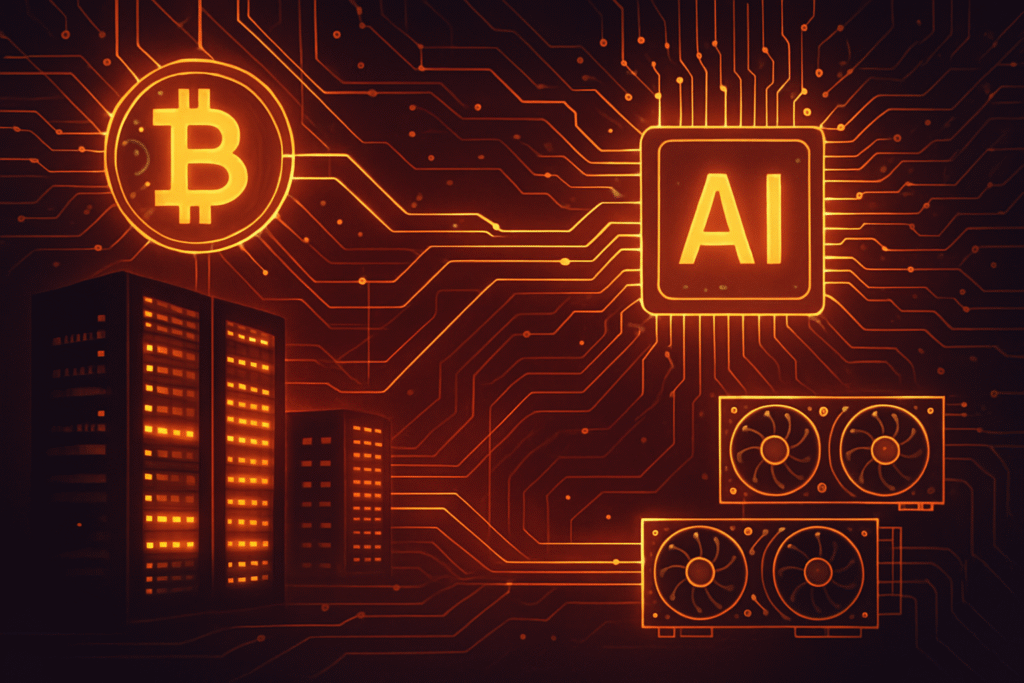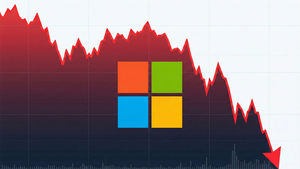
October 20, 2025 – A seismic shift is underway in the digital asset landscape, as a growing number of major cryptocurrency mining companies are aggressively pivoting towards Artificial Intelligence (AI) and High-Performance Computing (HPC) services. This strategic diversification, which gained significant momentum from mid-2023 and has dramatically accelerated throughout 2024 and 2025, signals a potential redefinition of the mining industry, moving beyond its singular focus on Bitcoin (BTC) to embrace the burgeoning demands of AI. The 2024 Bitcoin halving, which slashed mining rewards, served as a critical catalyst, forcing miners to seek more stable and profitable revenue streams.
The immediate market reaction to this strategic pivot has been overwhelmingly positive for the diversifying companies. Publicly traded mining firms like Core Scientific (NASDAQ: CORZ), Bitdeer Technologies Group (NASDAQ: BTDR), IREN (formerly Iris Energy) (NASDAQ: IREN), Hut 8 (NASDAQ: HUT), Cipher Mining (NASDAQ: CIFR), and TeraWulf (NASDAQ: WULF) have seen their stock valuations surge, reflecting investor confidence in their transformation into robust technology infrastructure providers. This trend is not merely about surviving post-halving challenges; it represents a proactive embrace of the AI revolution, leveraging existing energy-intensive data center infrastructure to meet the insatiable demand for computational power, thus reshaping the competitive dynamics of both the crypto mining and AI sectors.
Market Impact and Price Action
The strategic pivot by crypto miners into AI has ignited a significant rally in the stock prices of companies at the forefront of this diversification. Firms like IREN (NASDAQ: IREN) have seen their shares skyrocket by approximately 500% in 2025, while Cipher Mining (NASDAQ: CIFR) experienced an impressive surge of around 300%. Bitdeer Technologies Group (NASDAQ: BTDR) also witnessed a nearly 30% jump in its stock price following announcements of its AI data center expansion plans. This robust performance stands in stark contrast to the more volatile and often challenging environment faced by "pure-play" Bitcoin miners, indicating a clear market preference for diversified revenue models.
The market's enthusiasm stems from the perception that AI infrastructure offers more predictable and higher-margin revenue streams compared to the cyclical and reward-halving-impacted nature of Bitcoin mining. Analysts at Bernstein have noted that AI-focused Bitcoin miners are outperforming their rivals, attributing this to stronger conviction in the data center thesis and greater flexibility in volatile markets. This shift is attracting substantial capital, with public mining companies raising billions in debt to fund their AI ventures, underscoring investor belief in the long-term viability of this new direction.
While the stock performance of diversifying miners has been stellar, the direct impact on Bitcoin's price action has been more nuanced. Bitcoin itself has seen price surges, suggesting that the diversification isn't necessarily a bearish signal for the cryptocurrency. Instead, it reflects a maturation of the mining industry, where operators are optimizing their substantial infrastructure for broader technological demands. However, a potential long-term implication could be a gradual shift in the correlation between miner stock performance and Bitcoin's price, with miner valuations increasingly tied to their AI/HPC contracts rather than solely BTC's market movements. This could lead to a decoupling, where a miner's stock might thrive even if Bitcoin experiences a downturn, provided their AI ventures are robust.
Historically, major industry shifts within crypto mining, such as the ASIC revolution or significant regulatory crackdowns, have often led to periods of consolidation and short-term volatility. However, the current AI pivot is unique in that it introduces an entirely new, high-demand revenue stream, rather than simply optimizing existing operations. This suggests a more profound and potentially more stable transformation, with the potential to attract a broader base of institutional investors who might be wary of pure crypto exposure but keen on AI infrastructure plays.
Community and Ecosystem Response
The crypto community's reaction to miners' aggressive push into AI has been a mix of cautious optimism and strategic foresight. On platforms like Crypto Twitter and Reddit, discussions frequently highlight the necessity of this diversification, particularly in the wake of the 2024 Bitcoin halving, which significantly squeezed profit margins for many traditional miners. Many influencers and thought leaders view this as a pragmatic and intelligent evolution, enabling companies to "future-proof" their operations against the inherent volatility of the cryptocurrency market. They emphasize the smart utilization of existing infrastructure—large-scale data centers, access to low-cost power, and advanced cooling systems—which are equally crucial for demanding AI and HPC workloads.
However, a segment of the community expresses a degree of skepticism, questioning whether this pivot signals a foundational lack of confidence in the long-term profitability of pure Bitcoin mining, even as Bitcoin itself has demonstrated remarkable resilience and price growth. Some purists worry about a potential dilution of focus away from securing the Bitcoin network, while others see it as a natural progression, transforming miners into broader technology infrastructure providers rather than just single-asset specialists. The overarching sentiment, however, leans towards acknowledging the strategic brilliance of leveraging assets for dual-purpose revenue generation.
The implications for the broader crypto ecosystem, including related DeFi protocols, NFT projects, and Web3 applications, are still unfolding. While the direct impact on these segments might not be immediate, a more financially stable and diversified mining industry could indirectly benefit the entire ecosystem. Stable mining operations contribute to network security and decentralization, which are foundational to all Web3 initiatives. Furthermore, the expertise gained by these companies in managing large-scale compute infrastructure for AI could potentially be channeled back into developing more robust and efficient infrastructure for Web3 applications in the future, fostering innovation in areas like decentralized compute networks or ZK-proof generation.
Social media sentiment, while largely positive for the diversifying companies' stock performance, also reflects ongoing debates about energy consumption and sustainability. The ability to utilize the same energy-intensive infrastructure for both Bitcoin mining and AI—two of the most energy-hungry technologies—is seen by some as an efficient use of resources, while others raise concerns about the cumulative environmental footprint. This dialogue underscores the evolving narrative around crypto's role in the broader technological landscape, moving beyond just digital currency to encompass critical infrastructure for advanced computing.
What's Next for Crypto
The strategic pivot of crypto miners into AI has profound implications for the short and long-term trajectory of the cryptocurrency market. In the short term, we can expect continued outperformance of diversified mining stocks, attracting a new class of investors who are interested in AI infrastructure plays but might have been hesitant about pure crypto exposure. This could lead to increased institutional capital flowing into companies that successfully execute their AI strategies, further validating the model. We might also see a consolidation within the mining industry, where smaller, less adaptable miners struggle to compete post-halving, while larger, diversified players thrive.
Long-term, this trend could fundamentally alter the identity of the "crypto miner." Rather than being solely dependent on Bitcoin's price and mining difficulty, these companies are evolving into versatile data center operators capable of servicing a wide array of high-demand computing needs. This diversification offers a significant hedge against the inherent volatility of the crypto market, providing more stable and predictable revenue streams. It could also lead to a more resilient and sustainable crypto mining industry, less susceptible to market downturns and regulatory pressures specifically targeting cryptocurrency.
Potential catalysts to watch include further multi-billion dollar AI hosting contracts, similar to Core Scientific's (NASDAQ: CORZ) 12-year, $3.5 billion deal with AI cloud provider CoreWeave, or Cipher Mining's (NASDAQ: CIFR) $3 billion colocation agreement with Fluidstack. Each new major deal will likely fuel further investor confidence and potentially drive stock valuations higher. Additionally, technological advancements in energy efficiency and cooling solutions, driven by the dual demands of crypto mining and AI, could become significant competitive differentiators. Regulatory clarity around AI and data center operations will also play a crucial role in shaping the investment landscape.
For projects and investors, strategic considerations are paramount. Investors might increasingly look for mining companies with clear AI roadmaps and executed contracts, favoring them over those solely focused on Bitcoin. For crypto projects, the emergence of these hybrid infrastructure providers could open new avenues for scalable and cost-effective computing resources, potentially lowering barriers to entry for complex Web3 applications. Possible scenarios range from a complete transformation where "crypto miners" are primarily AI/HPC providers with a side of crypto mining (high likelihood), to a scenario where some companies attempt to balance both equally, finding a sweet spot in resource allocation (medium likelihood). The least likely scenario is a complete abandonment of Bitcoin mining, as it still provides a foundational revenue stream and asset.
Bottom Line
The diversification of crypto miners into AI represents a pivotal moment for both industries, signaling a maturation of the digital asset mining sector and its strategic integration into the broader technological infrastructure landscape. For crypto investors and enthusiasts, the key takeaway is the evolution of mining companies from speculative plays tied directly to Bitcoin's price into more robust, diversified technology firms. This shift offers a new layer of stability and potential for growth, driven by the insatiable demand for AI computational power. It suggests that the future of many mining operations will be less about pure Bitcoin accumulation and more about maximizing the utility of their energy-intensive infrastructure.
The long-term significance of this trend cannot be overstated. It effectively "future-proofs" a significant portion of the crypto mining industry, mitigating the risks associated with Bitcoin halving events and market volatility. By leveraging existing assets for high-margin AI hosting, these companies are creating more resilient business models that can weather various market conditions. This transformation could also lead to a more positive public perception of the crypto industry, as it demonstrates its capacity to contribute to cutting-edge technological advancements beyond just digital currencies.
Ultimately, this development means a more integrated and sophisticated crypto ecosystem. While Bitcoin remains a cornerstone, the infrastructure that supports its mining is now proving its versatility and value in the rapidly expanding AI arena. This dual-purpose utility enhances the overall value proposition of these companies and, by extension, the broader digital infrastructure sector. Important metrics to monitor going forward include the ratio of AI-derived revenue to crypto mining revenue for these companies, the continued signing of major AI hosting contracts, and any shifts in energy consumption patterns as they optimize for both workloads. The coming years will reveal the full extent of this transformation and its lasting impact on the digital economy.
This article is for informational purposes only and does not constitute financial or investment advice. Cryptocurrency investments carry significant risk.





